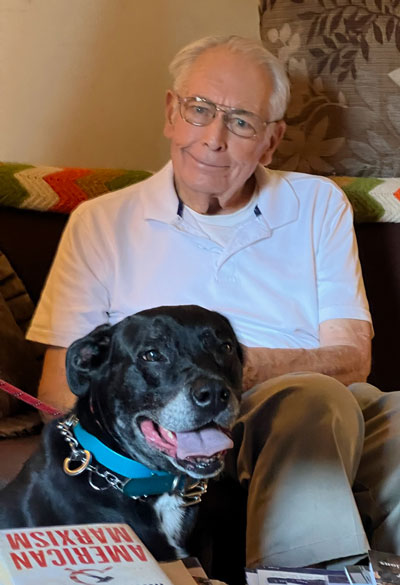In Part 1 of this series I asked the question: What impels a young man to embark on a life of missionary service to his LORD and Savior? It became clear, during my research, that John Birch received his “calling” to be a missionary from his Savior, Jesus, and he received that calling at a young age. He never turned back from serving his Savior, nor did he hesitate from going into harm’s way many times during that service. John was characterized by Robert Welch as “a simple, but highly intelligent man, who worked hard to serve God, spread God’s Word, and fought for the freedom to do so.” Many times during his wartime service, Birch longed for the day when he could farm his own land, marry and raise a family, and continue to serve God in his own way.
In a letter he called, “The War Weary Farmer”, written four months before his murder by Chinese communists in August, 1945, John wrote: “I should like to find the existence of what my father called ‘Plain living and high thinking.’ I want some fields and hills, woodlands and streams I can call my own. I want to spend my strength in making fields green, and the cattle fat, so that I may give sustenance to my loved ones, and aid to those neighbors who suffer misfortune. I do not want a life of monotonous paper shuffling or of trafficking with money-mad traders. I only want enough of science to enable fruitful husbandry of the land with simple tools, a time for leisure, and the guarding of my family’s health.”
God took John Birch home to be with Him in Paradise when he was only 27. Many would have considered that a great loss. In that same letter he expressed his longing for a long and simple life, with his sons and grandsons around him. He also wrote that, “I want of government only protection against the violence and injustices of evil or selfish men.” Although John was not blessed to accomplish all of his life’s goals, I’d like to believe that as he faced his death at the hands of murderous communist killers, he had a sense of accomplishment and serenity, knowing that God was calling him into Eternity with Him, with the words, “Well done, good and faithful servant….”
Last time, I left John Birch on a sampan in a river in China, where he had just met Lt. Col. Jimmy Doolittle, the commander of the daring raid on five Japanese cities on April 18, 1942. Sixty-two American flyers had been located and rescued by Chinese patriots in Japanese occupied China, after having been forced to bail out of their bombers when they ran out of fuel. Suddenly the young John Birch was face-to-face with the world-famous commander of these daring raiders. He must have been momentarily shocked as he shook hands with Doolittle and the other crewmen, for almost no one in China had been aware that the U.S. had struck a first blow for justice against the Japanese aggressors.
For the previous two years, John had been pastoring the Chinese people, bringing God’s Word to them. Every day he witnessed famine, disease, and the carnage wrought by the Japanese in their ruthless invasion and occupation of China, which began in earnest in 1937, with cities leveled, villages burned to ashes, and people, particularly women, horribly mistreated. Birch and other Christian missionaries had been struggling to feed starving people, nurse the wounded, protect women from violation, and find time to share God’s message of Salvation and love in a land that had known only chaos, war, and brutality for many years.
What many Americans don’t realize is that the Japanese invaders were not the sole enemy that the Chinese people faced. For years the military forces of the Nationalist government, led by Chiang Kai-shek, had been engaged in violent battles caused by an insurrection led by the Moscow trained Chou En-lai and Mao Tse-tung, two brutal communist leaders who, although they had no love for the occupying Japanese, nevertheless had been playing an insurrectionary “waiting game” with the Nationalist government under Chiang, and were planning on moving in and taking over the government when the Japanese moved out, as they inevitably would. (By 1942, the Communist insurrectionists already controlled parts of China.)
It was only a matter of time before the atrocities committed by the Japanese occupying forces became well known in the west generally, and in the U.S. specifically. After Pearl Harbor, our State Dept. ordered all missionaries to leave China, but John refused to leave the people he had grown to love, and was in turn loved by thousands of Chinese. However, the attack on Pearl had left Birch in a quandary. As a clergyman he was exempted from the draft. If he volunteered, would he have to forego his preaching and missionary work? John was a religious man, but he was no pacifist. He knew that in order to continue to bring God’s Word to the Chinese people the Japanese had to be defeated and driven out of China.
In one of his letters, Birch wrote to the American Military Mission in Chungking, and offered his services as an Army chaplain. Shortly thereafter, John accidentally met Lt. Col. Jimmy Doolittle in that sampan on the river, a meeting that changed history. With the aid of Chinese patriots, Birch led Doolittle and his men to safety in unoccupied China. He was then instructed to search for the other aircrews that had managed to escape from the clutches of the Japanese, and rescue them. John used his extensive network of contacts, developed during his missionary work, to discover the location of the other American flyers, and was able to ultimately get about 60 of them to safety.
-------------------------
Next time: Missionary John Birch meets Gen. Claire Chennault, Commander of the famous “Flying Tigers”, and joins the U.S. Army.













